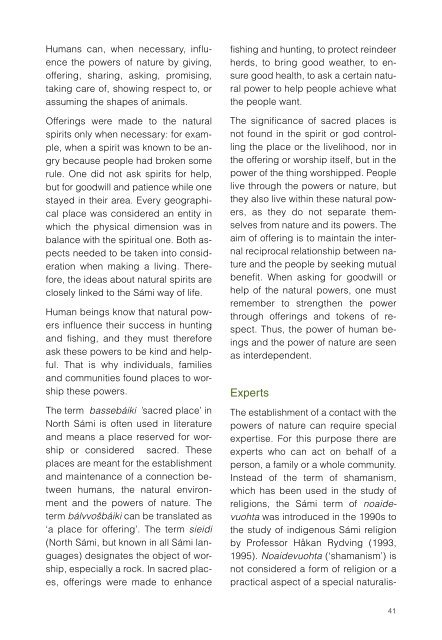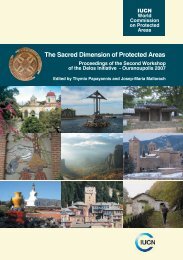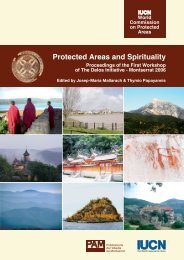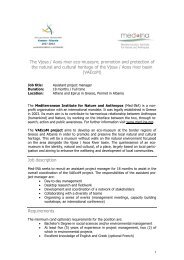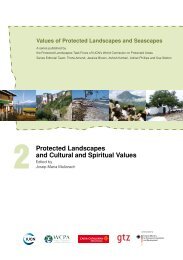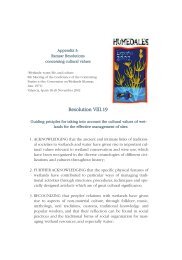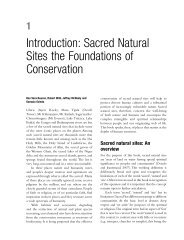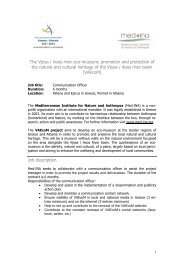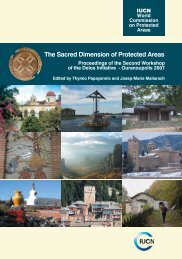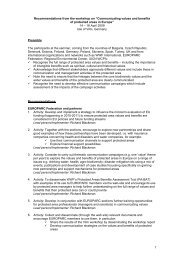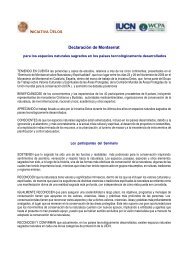The Diversity of Sacred Lands in Europe - IUCN
The Diversity of Sacred Lands in Europe - IUCN
The Diversity of Sacred Lands in Europe - IUCN
You also want an ePaper? Increase the reach of your titles
YUMPU automatically turns print PDFs into web optimized ePapers that Google loves.
Humans can, when necessary, <strong>in</strong>fluence<br />
the powers <strong>of</strong> nature by giv<strong>in</strong>g,<br />
<strong>of</strong>fer<strong>in</strong>g, shar<strong>in</strong>g, ask<strong>in</strong>g, promis<strong>in</strong>g,<br />
tak<strong>in</strong>g care <strong>of</strong>, show<strong>in</strong>g respect to, or<br />
assum<strong>in</strong>g the shapes <strong>of</strong> animals.<br />
Offer<strong>in</strong>gs were made to the natural<br />
spirits only when necessary: for example,<br />
when a spirit was known to be angry<br />
because people had broken some<br />
rule. One did not ask spirits for help,<br />
but for goodwill and patience while one<br />
stayed <strong>in</strong> their area. Every geographical<br />
place was considered an entity <strong>in</strong><br />
which the physical dimension was <strong>in</strong><br />
balance with the spiritual one. Both aspects<br />
needed to be taken <strong>in</strong>to consideration<br />
when mak<strong>in</strong>g a liv<strong>in</strong>g. <strong>The</strong>refore,<br />
the ideas about natural spirits are<br />
closely l<strong>in</strong>ked to the Sámi way <strong>of</strong> life.<br />
Human be<strong>in</strong>gs know that natural powers<br />
<strong>in</strong>fluence their success <strong>in</strong> hunt<strong>in</strong>g<br />
and fish<strong>in</strong>g, and they must therefore<br />
ask these powers to be k<strong>in</strong>d and helpful.<br />
That is why <strong>in</strong>dividuals, families<br />
and communities found places to worship<br />
these powers.<br />
<strong>The</strong> term bassebáiki ’sacred place’ <strong>in</strong><br />
North Sámi is <strong>of</strong>ten used <strong>in</strong> literature<br />
and means a place reserved for worship<br />
or considered sacred. <strong>The</strong>se<br />
places are meant for the establishment<br />
and ma<strong>in</strong>tenance <strong>of</strong> a connection between<br />
humans, the natural environment<br />
and the powers <strong>of</strong> nature. <strong>The</strong><br />
term bálvvošbáiki can be translated as<br />
‘a place for <strong>of</strong>fer<strong>in</strong>g’. <strong>The</strong> term sieidi<br />
(North Sámi, but known <strong>in</strong> all Sámi languages)<br />
designates the object <strong>of</strong> worship,<br />
especially a rock. In sacred places,<br />
<strong>of</strong>fer<strong>in</strong>gs were made to enhance<br />
fish<strong>in</strong>g and hunt<strong>in</strong>g, to protect re<strong>in</strong>deer<br />
herds, to br<strong>in</strong>g good weather, to ensure<br />
good health, to ask a certa<strong>in</strong> natural<br />
power to help people achieve what<br />
the people want.<br />
<strong>The</strong> significance <strong>of</strong> sacred places is<br />
not found <strong>in</strong> the spirit or god controll<strong>in</strong>g<br />
the place or the livelihood, nor <strong>in</strong><br />
the <strong>of</strong>fer<strong>in</strong>g or worship itself, but <strong>in</strong> the<br />
power <strong>of</strong> the th<strong>in</strong>g worshipped. People<br />
live through the powers or nature, but<br />
they also live with<strong>in</strong> these natural powers,<br />
as they do not separate themselves<br />
from nature and its powers. <strong>The</strong><br />
aim <strong>of</strong> <strong>of</strong>fer<strong>in</strong>g is to ma<strong>in</strong>ta<strong>in</strong> the <strong>in</strong>ternal<br />
reciprocal relationship between nature<br />
and the people by seek<strong>in</strong>g mutual<br />
benefit. When ask<strong>in</strong>g for goodwill or<br />
help <strong>of</strong> the natural powers, one must<br />
remember to strengthen the power<br />
through <strong>of</strong>fer<strong>in</strong>gs and tokens <strong>of</strong> respect.<br />
Thus, the power <strong>of</strong> human be<strong>in</strong>gs<br />
and the power <strong>of</strong> nature are seen<br />
as <strong>in</strong>terdependent.<br />
Experts<br />
<strong>The</strong> establishment <strong>of</strong> a contact with the<br />
powers <strong>of</strong> nature can require special<br />
expertise. For this purpose there are<br />
experts who can act on behalf <strong>of</strong> a<br />
person, a family or a whole community.<br />
Instead <strong>of</strong> the term <strong>of</strong> shamanism,<br />
which has been used <strong>in</strong> the study <strong>of</strong><br />
religions, the Sámi term <strong>of</strong> noaidevuohta<br />
was <strong>in</strong>troduced <strong>in</strong> the 1990s to<br />
the study <strong>of</strong> <strong>in</strong>digenous Sámi religion<br />
by Pr<strong>of</strong>essor Håkan Rydv<strong>in</strong>g (1993,<br />
1995). Noaidevuohta (‘shamanism’) is<br />
not considered a form <strong>of</strong> religion or a<br />
practical aspect <strong>of</strong> a special naturalis-<br />
41


